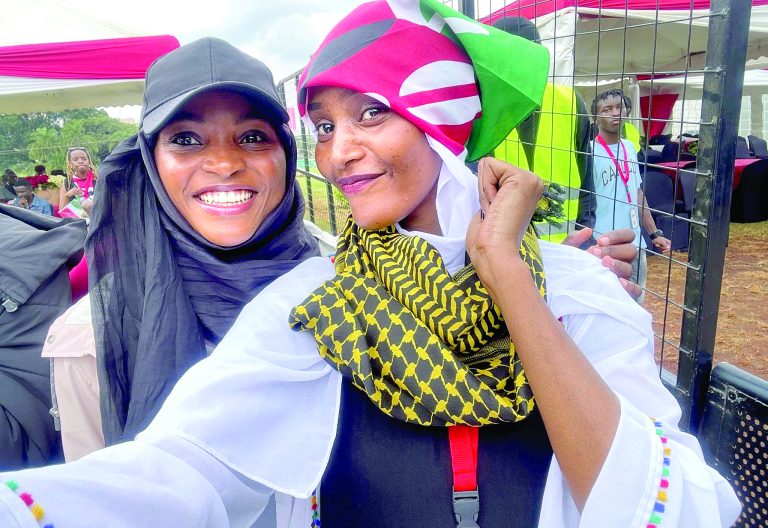Gen-Z ladies step forward to speak painful truth to power

For decades, Kenyan men have dominated the frontline spaces in the push for democracy, human rights and economic emancipation.
Sometimes last year however, a new wave of activism began to take shape in the heart of Kenya, spearheaded by a generation often seen as the future but now standing boldly to shape the present.
This movement, driven by Gen Z, found its pulse in the youth’s quest for justice, equity, and change in a nation grappling with economic inequality, corruption, and systemic failures.
What began as a cry for economic reform evolved into a wider call for justice with hordes of young women, many of who had spent years watching their mothers fight for basic rights, coming out determined to create a change that would last.
The brutality of police repression, gendered violence, and societal inequality all became central to their battle.
Frontline
And these women were not afraid to step into the frontline, determined to make their voices heard, knowing that their future—and the future of Kenya—was at stake.
Among the many faces of the protests were women like Sharon Wangari, a vocal activist who has been at the forefront of pushing for accountability in governance.
“I was always told that my voice didn’t matter, that my education and career prospects would be limited because I was a woman,” she said in an interview.
But as Kenya’s economic crisis worsened, Wangari found herself leading protest groups, organizing rallies, addressing crowds and appearing on TV shows to articulate their cause.
“I felt like I couldn’t just sit back and wait for someone else to take charge. I had to stand up for what I believed in,” she explained.
Her impassioned speeches and digital advocacy have galvanized thousands to demand justice and better leadership.
Shakira Wafula is an activist and fitness instructor, who has used both digital and on-the-ground activism to challenge injustices and highlight the plight of marginalized communities. Her efforts in recent protests have demonstrated the power of women’s leadership in shaping Kenya’s activism landscape.
“The growing participation of women in demonstrations signifies a shift in gender roles within activism. Women are no longer just supporting figures in protests, they are leading them, shaping narratives, and challenging oppressive systems. This change also highlights the power of social media in activism, as women leverage digital platforms to mobilize, educate, and challenge injustices,” says Wanjira Wanjiru, a well-known activist.
Wanjira who has been instrumental in mobilizing young people for social justice causes says that her dedication to grassroots activism has inspired many women to take a stand against oppression and demand systemic change.
According to Perpetua Kariuki a human rights defender, this shift is because for years women have faced abuse and discrimination. However, they have increasingly recognized that issues such as police violence, gender-based violence, healthcare crises, and the rising cost of living directly impact their lives. As a result, women have been turning out in large numbers during recent protests, raising their voices against injustices and demanding action on factors that contribute to economic hardship and inadequate services.
“The injustices we face daily whether economic, social, or political have pushed us to the forefront of these movements. We are fighting for our rights, our safety, and a better future,” says Kariuki.
According to her, the growing participation of women in activism signals a transformative shift that is likely to shape future movements in Kenya. As more women take leadership roles in protests and advocacy, their voices will continue to influence policy decisions and demand accountability on issues affecting them. This shift also paves the way for greater representation in governance, as activism often serves as a stepping-stone for political engagement.
Amplify message
She reveals that the increasing access to digital platforms has also helped women to amplify their messages beyond the streets, building solidarity networks and pushing for sustained action on social and economic justice. If this momentum continues, women will not only be participants in activism but also key drivers of systemic change in Kenya.
According to Wanjira, despite this shift, women leading the movement are often labeled as “hard-headed” or “defiant” for refusing to conform to traditional patriarchal expectations. Society still holds deep-seated biases that view a woman’s primary role as being in the home, rather than in the streets advocating for justice.
Many female activists according to her face backlash, including online harassment, intimidation, and even threats, simply for speaking out on issues that affect them and their communities. However, these challenges have not deterred women instead, they have fuelled their determination to push for change, proving that activism is no longer a male-dominated space.
These young women didn’t only march—they strategized, organized, and worked to ensure that the voices of the youth were not drowned out by those in power.
From grassroots organizing to digital activism, they became the backbone of the Gen Z demonstrations. Their actions challenged traditional gender roles and expectations, proving that women could be leaders in movements of political change.















